Outstanding performances from Canadian pair teams at first Olympic Games
It took Olympic moments to get onto the podium in the Sochi pairs event. Mistakes could be crushing.
Kirsten Moore-Towers and Dylan Moscovitch had an Olympic moment, skating with speed and flair, putting themselves into first place for a time. But Moscovitch had doubled a triple salchow – without Moore-Towers even seeing it. She celebrated at the end, jumping up and down on the ice with glee. Then she found out.
“We feel we were pretty great,” she said afterward. “I was very happy with the performance. We were knocking things off one by one.”
Their small glitch did not interrupt the program. “I still think it was great,” she said. “I’m just so excited”
They both skated with comfort and ease and sailed into fifth place in a tightly fought contest, although it was their first appearance at an Olympic Games. They defeated Canadian champions Meagan Duhamel and Eric Radford by 2.57 points after their friends made mistakes, just a few too many to swim upstream.
Moore-Towers and Moscovitch finished ahead of the Canadian champs in the free skate with 131.18 points and in the overall total score of 202.10.
Duhamel and Radford chalked up a season’s best mark of 127.32 in the long program and finished seventh overall with 199.53.
Of course, nobody could touch Russians Tatiana Volosozhar and Maxim Trankov, even on a day when they didn’t skate their best. Despite a handful of tiny miscues, the Russians won the free skate with 152.69 points and a final score of 236.86. Trankov threw his fist in the air when he finished, sunk to his knees, then kissed the ice during a standing ovation.
Their compatriots, Ksenia Stolbova and Fedor Klimov – junior skaters a couple of years ago – delivered the best performance of their lives under pressure and earned the silver medal, with 218.68 points, 18.18 points behind the gold medalists. It was a personal best for them. “That’s the way you have to do your job if you want to achieve success,” Stolbova said. It’s the first time since the 1998 Nagano Olympics that Russians have stood one-two on the podium, a far cry from the 2010 Olympics four years ago, when none did.
It was a heartbreaking day for four-time world pair champions Aliona Savchenko and Robin Szolkowy of Germany, who had stayed around for four years to improve on the bronze medal they had in Vancouver. Actually, they spent four years in search of gold. This time, they won bronze again, and Szolkowy had to comfort a tearful Savchenko on the medal podium.
The gold slipped out of their hands early in the program when Szolkowy fell on a triple toe loop combination. Points flew out of their grasp. They tried to pull out all the stops by including a throw triple Axel at the end, but Savchenko fell on it. They finished with 215.78 points.
Pang Qing and Tong Jian of China were fourth with 209.88 points in their final Olympic performance, after having troubles in the jumps early.
Paige Lawrence and Rudi Swiegers were 14th, with troubles on their double Axels, and a fall on a throw triple loop. They took bows upon bows upon bows, with Lawrence admitting she just didn’t want to get off the ice. “That was fun,” she said.
“I fell on the throw loop, but I got up really fast,” she said. “Honestly, I was enjoying myself the whole time. I was in the moment and enjoying the music. I was living out the dream I’ve had since I was a little girl.”
“Coming in, I was so excited to skate. Every time I’m out on the ice, I don’t ever want to get off. That’s why I kept curtseying. I wish I could stay out there and curtsey to every single person. It’s really been the experience of a lifetime.”
Trankov admitted that he and his partner dealt with huge pressure. “Today was a big day for all of Russia,” he said. “It was the hardest job of our lives.”
Volosozhar, usually cool at all times, appeared overwhelmed after the final pose. “To be honest, I was crying because I felt so many emotions, nerves, concentration,” she said. “I’m still nervous and shaking, but I’m also so happy. We did really well today.”
They had taken a nine-point lead into the free program and they started off spectacularly, with a huge triple twist. Their triple toe loop combination jump lost a tiny bit of unison, as did a side by side spin. Volosozhar put a hand down on a throw triple loop.
Duhamel and Radford, third at the world championships last year, had such high hopes and left the rink feeling disappointed. Duhamel fell on a triple Salchow, and then touched her hands to the ice on a throw triple Lutz. Their final spin lost unison. They had started strongly with a triple twist, and a triple Lutz jump that just sailed.
“I don’t know what happened,” Duhamel said. “We felt really good. We were in the zone. The first half of the program was great. I don’t know what went wrong. I surprised myself on the Salchow. It wasn’t our best.”
Radford said they felt very strong and well trained when they went out onto the ice. “Somehow, things just didn’t work out,” he said.
But, he added, they were very happy with their Olympics. It had taken them both years to get to their first Games. She is 28, he 29.
Beverley Smith


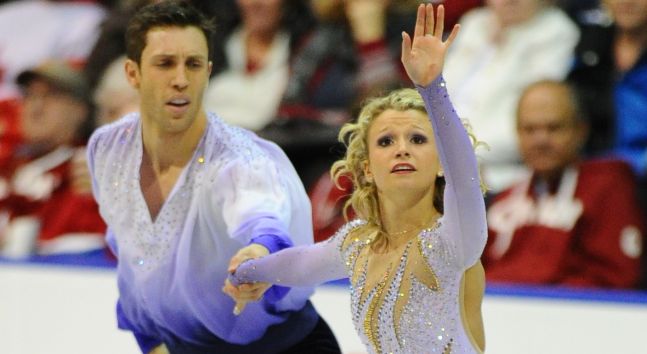
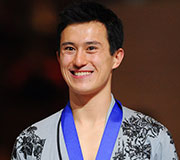
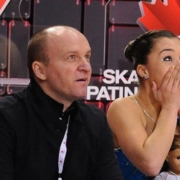
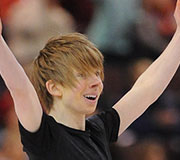
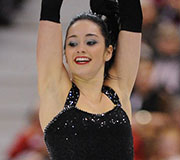

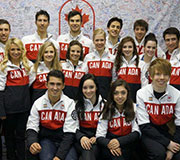
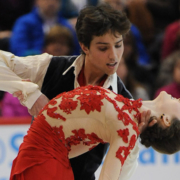
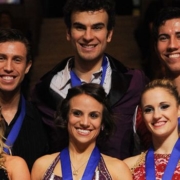


Leave a Reply
Want to join the discussion?Feel free to contribute!